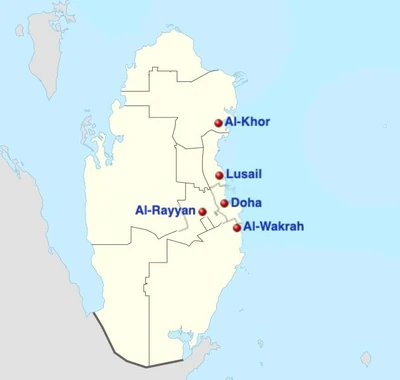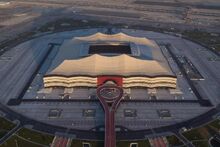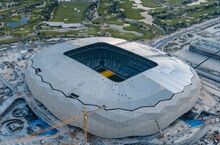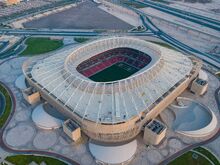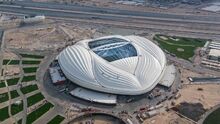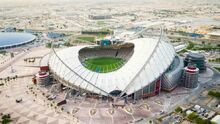|
Future Event
This article or section contains information about scheduled or expected future events.
It may contain tentative information; the content may change as the event approaches and more information becomes available. |
| كأس العالم لكرة القدم 2022 Kaʾs al-ʿālam li-kurrat al-qadam 2022 Qatar 2022 | |
 Tournament logo | |
| Tournament details | |
|---|---|
| Host country | |
| Dates | 21 November – 18 December |
| Teams | 32 (from 5 or 6 confederations) |
| Venue(s) | 8 or 12 |
← 2018 2026 → | |
The 2022 FIFA World Cup will be the 22nd FIFA World Cup, an international football tournament that is scheduled to take place in 2022 in Qatar.
The tournament will involve 32 national teams, including that of the host nation, assuming the current format of the finals is maintained. This is the first time a country in the Middle East will host the World Cup.
In May 2011, allegations of corruption within the FIFA senior officials raised questions over the legitimacy of the World Cup being held in Qatar. According to the vice-President Jack Warner, an email has been publicised about the possibility that Qatar 'bought' the 2022 World Cup through bribery via Mohammed bin Hammam who was president of the Asian Football Confederation at the time. Qatar's officials in the bid team for 2022 have denied any wrongdoing. The whistleblower at the centre of the story later claimed to have fabricated the allegations of corruption. FIFA confirmed receipt of the retraction.
The scheduling of the event is, as of January 2014, still uncertain. Concerns about holding the event during the traditional months for the World Cup finals of June and July have been expressed since the bid was made due to the climate in Qatar. In October 2013, a taskforce was commissioned to consider alternative dates, and report after the 2014 World Cup in Brazil.
Logistical complications relating to the proposed change in timing caused FIFA President Sepp Blatter to admit in late 2013 that selecting Qatar as the host country may have been a mistake.
The issue of migrant workers' rights has also attracted attention, with an investigation by the Guardian newspaper claiming that many workers are denied food and water, have their identity papers taken away from them, and that they are not paid on time or at all, making some of them in effect slaves. The Guardian has estimated that up to 4000 workers may die due to lax safety and other causes by the time the competition is held.
Host selection
The bidding procedure to host the 2018 and 2022 FIFA World Cups began in January 2009, and national associations had until 2 February 2009 to register their interest. Initially, eleven bids were made for the 2018 FIFA World Cup, but Mexico later withdrew from proceedings, and Indonesia's bid was rejected by FIFA in February 2010 after the Indonesian government failed to submit a letter to support the bid. Indonesian officials had not ruled out a bid for the 2026 FIFA World Cup, until Qatar took the 2022 cup. During the bidding process, all non-UEFA nations gradually withdrew from the 2018 bids, thus making the UEFA nations ineligible for the 2022 bid.
There were eventually five bids for the 2022 FIFA World Cup: Australia, Japan, Qatar, South Korea and the United States. The twenty-two member FIFA Executive Committee convened in Zürich on 2 December 2010 to vote to select the hosts of both tournaments. The decision to host the 2022 World Cup in Qatar, which was graded as having "high operational risk", generated criticism from media commentators, LGBT rights groups and American, Australian and English officials. There have been allegations of bribery or corruption in the selection process involving four members of FIFA's executive committee, which FIFA investigated. However the whistleblower, revelead to be Phaedra Almajid, later retracted her claims of bribery. She claimed she fabricated them in order to exact revenge on the Qatari bid team for relieving her of her job with them. She also denied being put under any pressure to make her retraction. FIFA confirmed receiving an email from her which stated her retraction.
Qatar is the smallest nation by area ever to have been awarded a FIFA World Cup - the next smallest by area is Switzerland, host of the 1954 FIFA World Cup, which is more than three times as large as Qatar. Qatar is also expected to be the second-smallest host by population to host the competition - Uruguay had a population of 1.7 million by the time it hosted the 1930 World Cup, already less than Qatar's current 2013 population of 1.9 million.
The voting patterns were as follows:
| Bidders | Votes | |||
|---|---|---|---|---|
| Round 1 | Round 2 | Round 3 | Round 4 | |
|
11 | 10 | 11 | 14 |
| 3 | 5 | 6 | 8 | |
| 4 | 5 | 5 | — | |
| 3 | 2 | — | — | |
| 1 | — | — | — | |
Qualification
- Main article: 2022 FIFA World Cup qualification
The qualification process for the 2022 World Cup has not yet been announced. All FIFA member associations, of which there are currently 209, are eligible to enter qualification. Qatar, as hosts, qualified automatically for the tournament.
Qualified teams
| Team | Order of qualification |
Method of qualification |
Date of qualification |
Finals appearance |
Last appearance |
Previous best performance |
FIFA Ranking at start of event |
|---|---|---|---|---|---|---|---|
| 1st | Host | 2 December 2010 | 1st |
As of and inclusive of the 2014 cycle, Qatar had never qualified for a previous FIFA World Cup.
Venues
The first five proposed venues for the World Cup were unveiled at the beginning of March 2010. The stadiums aim to employ cooling technology capable of reducing temperatures within the stadium by up to 20 °C (36 °F), and the upper tiers of the stadiums will be disassembled after the World Cup and donated to countries with less developed sports infrastructure. All of the five stadium projects launched have been designed by German architect Albert Speer & Partners.
The Al-Khor Stadium is planned for Al Khor, located 50 kilometres north of Doha. The stadium will have a total capacity of 45,330, with 19,830 of the seats forming part of a temporary modular upper tier. The Al-Wakrah Stadium, to be located in Al-Wakrah in southern Qatar, will have a total capacity of 45,120 seats. The stadium will also contain a temporary upper tier of 25,500 seats. The stadium will be surrounded by large solar panels and will be decorated with Islamic art. The Al-Wakrah and Al-Khor stadiums would have been built regardless of whether Qatar was awarded the World Cup, according to the bid committee. However, the temporary upper-tier sections will now also be added as Qatar has won the right to host the tournament.
A report released on 9 December 2010 quoted FIFA President Sepp Blatter as stating that Qatar's neighbours could host some matches during the World Cup. However, no specific countries were named in the report. Blatter added that any such decision must be taken by Qatar first and then endorsed by FIFA's executive committee. Prince Ali bin Al Hussein of Jordan told the Australian Associated Press that holding games in Bahrain, United Arab Emirates, and possibly Saudi Arabia would help to incorporate the people of the region during the tournament.
According to a report released in April 2013 by Merrill Lynch; the investment banking division of Bank of America, the organizers in Qatar have requested from FIFA to approve a smaller number of stadiums due to the growing costs. Bloomberg.com said that Qatar wishes to cut the number of venues to 8 or 9 from the 12 originally planned.
| Lusail (Doha area) |
Al Khor | ||
|---|---|---|---|
| Lusail Iconic Stadium | Al Bayt Stadium | ||
| Capacity: 80,000 (under construction) |
Capacity: 60,000 | ||
| Al Rayyan (Doha area) | |||
| Education City Stadium | Al-Rayyan Stadium | ||
| Capacity: 45,350 | Capacity: 44,740 | ||
| Al Wakrah | Doha | ||
| Al Janoub Stadium | Ras Abu Aboud Stadium | Al Thumama Stadium | Khalifa International Stadium |
| Capacity: 40,000 | Capacity: 40,000 (under construction) |
Capacity: 40,000 (under construction) |
Capacity: 40,000 |
Hosting issues
A number of Western groups and media outlets have expressed concern over the suitability of Qatar to host the event, with regard to interpretations of human rights press freedom, and climatic conditions.
Alcohol
Hassan Abdulla al Thawadi, chief executive of the Qatar 2022 World Cup bid, said the Muslim state would also permit alcohol consumption during the event. Specific fan-zones will be established where alcohol can be bought. Though legal with a permit, drinking in public is not permitted as Qatar's legal system is based on Sharia law.
Israeli qualification
The head of the Qatar bid delegation stated that if Israel were to qualify, they would be able to compete in the World Cup despite Qatar not recognising the sovereignty of Israel.
Climate
Criticism arose over hosting the tournament in summer as temperatures could reach 50 °C (122 °F). The inspection team for evaluating who would host the tournament said that Qatar was "high risk" due to the weather. Even FIFA President Sepp Blatter, who initially rejected the criticism, said that in September 2013 the FIFA executive committee would evaluate the feasibility of a winter event. The English Premier League voiced concern over moving the tournament to the northern hemisphere's winter as it could interfere with the local leagues. FA Chairman Greg Dyke said, shortly after he took his job in 2013, that he was open to either a winter tournament or moving the tournament to another country.
In October 2013, a taskforce was commissioned to consider alternative dates, and report after the 2014 World Cup in Brazil. In early 2014, FIFA Secretary-General Jerome Valcke appeared to preempt this, saying: "Frankly, I think it will happen between November 15 and the end of December because that is when the weather is more favourable. It’s more like springtime in Europe." This was controversial within FIFA itself, with Vice President Jim Boyce responding in saying that "it absolutely has not been decided as far as the executive committee are concerned. It was agreed all the stakeholders should meet, all the stakeholders should have an input and then the decision would be made, and that decision as far as I understand will not be taken until the end of 2014 or the March executive meeting in 2015. As it stands it remains in the summer with no decision expected until end of 2014 or March 2015."
Provision inside stadiums
As the World Cup usually occurs during the northern hemisphere's summer, the weather in Qatar was a concern with temperatures reaching more than 50 °C (122 °F). However, the Qatar bid's chief executive, Hassan al-Thawadi said "Heat is not and will not be an issue." The Qatar 2022 Bid's official site also explains:
"Each of the five stadiums will harness the power of the suns rays to provide a cool environment for players and fans by converting solar energy into electricity that will then be used to cool both fans and players at the stadiums. When games are not taking place, the solar installations at the stadiums will export energy onto the power grid. During matches, the stadiums will draw energy from the grid. This is the basis for the stadiums’ carbon-neutrality. Along with the stadiums, we plan to make the cooling technologies we’ve developed available to other countries in hot climates, so that they too can host major sporting events."
This method of cooling techniques is theoretically able to reduce temperatures from 50 to 27 °C (122 to 81 °F). The bidding committee also proposes to use such cooling technologies in fan-zones, training pitches and walkways between metro stations and stadiums.
Two doctors from Qatar's Aspetar sports hospital in Doha who gave an interview in November 2010 to Qatar Today magazine said the climate would be an issue in saying that the region's climate would "affect performance levels from a health point of view" of professional athletes, specifically footballers, that "recovery times between games would be longer" than in a temperate climate and that, on the field of play, "more mistakes would be made". Additionally, one of the doctors said that "total acclimation (to the Qatari climate) is impossible."
Franz Beckenbauer, a member of FIFA's executive committee, said Qatar could be allowed to host 2022 World Cup in winter. He justified his proposal on grounds that Qatar will be saving money, which otherwise they would have spent in cooling the stadiums. Beckenbauer said "One should think about another solution. In January and February you have comfortable 25 °C (77 °F) there," he said. "Qatar won the vote and deserves a fair chance as the first host from the Middle East." At a ceremony in Qatar marking the occasion of having been awarded the World Cup, FIFA President Sepp Blatter later agreed that this suggestion was plausible, but FIFA later clarified that any change from the bid position of a June/July games would be for the host association to propose.
The notion of holding the Cup during Europe's winter was further boosted by the UEFA President Michel Platini indicating that he was ready to rearrange the European club competitions accordingly. Platini's vote for the summer 2022 World Cup went to Qatar. FIFA President Sepp Blatter also said that despite air-conditioned stadiums the event was more than the games itself and involved other cultural events. In this regard, he questioned if fans and players could take part in the summer temperatures.
FIFA executive committee member Theo Zwanziger said that awarding the 2022 World Cup to Qatar's desert state was a "blatant mistake", and that any potential shift to a winter event would be unmanagable due to the effect on major European domestic leagues.
Human rights
Homosexual fans
The status of homosexuality as illegal in Qatar attracted attention in the media. FIFA President Sepp Blatter initially said: "I would say they should refrain from any sexual activities;" he later added that "we [FIFA] don't want any discrimination. What we want to do is open this game to everybody, and to open it to all cultures, and this is what we are doing in 2022."
Migrant workers
Human Rights Watch and the International Trade Union Confederation allege that the Kafala system leaves migrant workers vulnerable to systematic abuse. Workers may not change jobs or even leave the country without their sponsor's permission. In November 2013, Amnesty International reported "serious exploitation", including workers having to sign false statements that they had received their wages in order to regain their passports. After visiting a labour camp, Sharan Burrows of the ITUC described the workers as "basically slaves" and added that "If two years on [since the award of the 2022 World Cup] the [Qatari] Government has not done the fundamentals, they have no commitment to human rights." The Qatar 2022 Supreme Committee said: "Our commitment is to change working conditions in order to ensure a lasting legacy of improved worker welfare. We are aware this cannot be done overnight. But the 2022 FIFA World Cup is acting as a catalyst for improvements in this regard."
Nepalese ambassador to Qatar, Maya Kumari Sharma, said that Qatar had become "an open jail" for workers from her homeland. A September 2013 report by The Guardian said a number of Nepalese workers have faced poor conditions as companies handling construction for 2022 World Cup infrastructure forced workers to stay by denying them promised salaries and withholding necessary worker ID permits, rendering them illegal aliens. The Guardian wrote that their investigation "found evidence to suggest that thousands of Nepalese, who make up the single largest group of labourers in Qatar, face exploitation and abuses that amount to modern-day slavery, as defined by the International Labour Organisation, during a building binge paving the way for 2022." Nepalese workers in Qatar have been dying at a rate of one per day. A video report accompanying The Guardian's article showed men living in labour camps with unsanitary and dilapidated conditions. Workers told The Guardian they were promised high salaries before coming to Qatar and then their contracts were destroyed upon their arrival to Qatar. Some said they had not been paid in months, but the construction companies denied them their worker IDs or passports, rendering them trapped. Workers described having to beg for food and being beaten. They could try to escape, but if caught without proper papers, they would be arrested. The Qatar 2022 Supreme Committee denied that construction directly related to the World Cup had yet begun but told The Guardian they are "deeply concerned with the allegations" and said, "We have been informed that the relevant government authorities are conducting an investigation into the allegations."
Cost
By some estimates, the World Cup is going to cost Qatar approximately £138 billion (US$220 billion). This is about 60 times the $3.5 billion that South Africa spent on the 2010 FIFA World Cup. Dr Nicola Ritter, a German legal and financial analyst, told an investors' summit held in Munich that £107 billion would be spent on stadiums and facilities plus a further £31 billion on transport infrastructure. Ritter said £30 billion would be spent on building air-conditioned stadiums with £48 billion on training facilities and accommodation for players and fans. A further £28 billion will be spent on creating a new city called Lusail that will surround the stadium that will host the opening and final matches of the tournament.
Marketing
Branding
The tournament logo was unveiled on 3 September 2019. The official unveiling took place in Doha, at 20:22 local time, with thousands of spectators witnessing the synchronised projection of the emblem onto a number of the country’s most iconic buildings, including Burj Doha, Katara Cultural Village Amphitheatre, Ministry of Interior, Souq Waqif and Msheireb and Al Zubarah Fort, a UNESCO World Heritage site. The emblem’s design embodies the vision of an event that connects and engages the entire world, while also featuring striking elements of local and regional Arab culture and allusions to the beautiful game. The swooping curves of the emblem represent the undulations of desert dunes and the unbroken loop depicts both the number eight – a reminder of the eight astonishing stadiums that will host matches – and the infinity symbol, reflecting the interconnected nature of the event. Besides echoing the shape of the iconic FIFA World Cup Trophy, the emblem’s central form takes inspiration from a traditional woollen shawl.
Broadcasting rights
- Australia – SBS
- Brazil – Rede Globo
- Canada – CTV, TSN, RDS
- Caribbean – International Media Content, SportsMax
- Europe – European Broadcasting Union (37 countries)
- Middle East – Al Jazeera
- Portugal - RTP
- Sweden – SVT, TV4
- Switzerland – SRG SSR
- United States – Fox, Telemundo
See also
External links
| 2022 FIFA World Cup stadiums |
| Al Bayt Stadium (Al Khor) · Al Rayyan Stadium (Al Rayyan) · Al Thumama Stadium (Doha) · Al Janoub Stadium (Al Wakrah) · Education City Stadium (Doha) · Khalifa International Stadium (Doha) · Lusail Stadium (Lusail) · Stadium 974 (Doha) |

